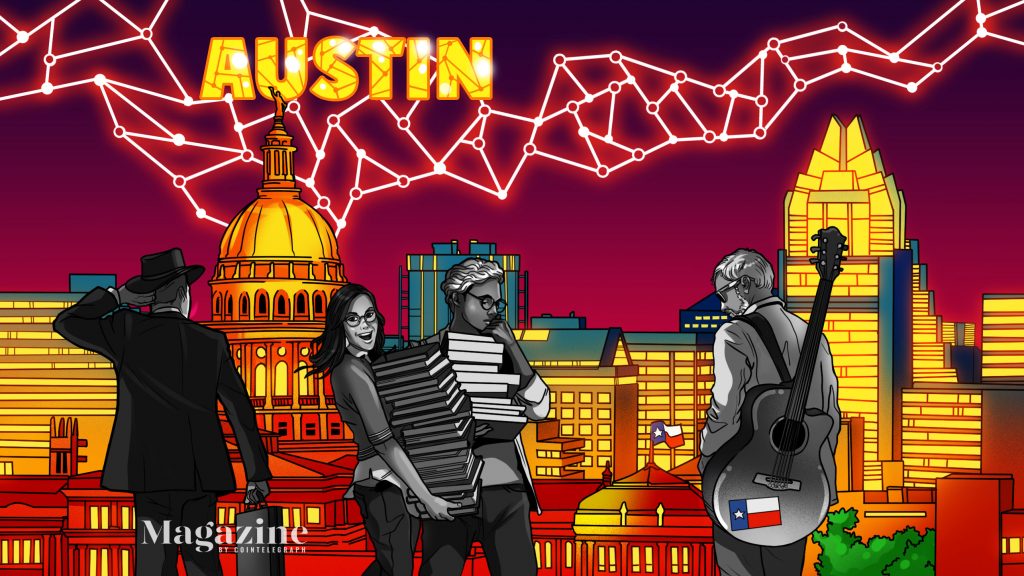Guide to Austin – Cointelegraph Magazine

This “Crypto City” guide looks at Austin’s crypto culture, the city’s most notable projects and people, its financial infrastructure, which retailers accept crypto and where you can find blockchain education courses — and there are even the juicy details of a famous controversy. Everything is bigger in Texas, including its enthusiasm for crypto.
Fast facts
City: Austin
Country: United States
Population: 974,000
Founded: 1839
Language: English
The capital of the largest state in the contiguous United States, Austin is known as a live music mecca, with festivals drawing in thousands of people from around the world each year, including Austin City Limits and South by Southwest. The Texas city is a unique blend of liberal and conservative values, yet in many ways, it still operates under the old motto “keep Austin weird,” with the University of Texas at Austin home to a diverse student body and the popular Texas Longhorns football team.
Long before becoming a hub of major tech companies — earning it the nickname “Silicon Hills” — Austin drew settlers from Mexico and the United States around the time Texas became an independent nation in 1836. Texas has stood under three flags with Austin as its capital: the Republic of Texas, the Confederacy and the United States of America. Though the city was largely centered around the capitol building completed in 1888, it later became known to many as a college town. For some years, the University of Texas at Austin was the largest university in the country by enrollment.
Austin and the surrounding area have also been the shooting location for a number of famous films, including Death Proof from director Quentin Tarantino, Dazed and Confused — Matthew McConaughey’s first movie role — and many others. Though the city once drew, and still does draw, many starving artists pursuing their passions, interest from major corporations and their wealthy executives has begun to drive many natives and newbies alike out of the area due to rising rent and housing prices.
As the population of Austin grows, gentrification and commuting times remain a large problem for many residents. The main highway, Interstate 35 — which separates the downtown area from the freshly redeveloped East Austin — seems inadequately designed to accommodate the rising number of Austinites, with some traveling up to 30 miles between their homes and offices. The city faces challenges including a lack of publicly provided infrastructure for its homeless population, the way Austin’s land can be used, and other issues endemic to the rest of the United States.
Crypto culture
Many Texans have a “don’t tread on me” approach to local, state and federal governments telling them how to handle their business, their money and their personal life, despite the state showing only a lone star on its flag rather than a snake. In some ways, Austin residents’ response to digital assets since 2011 has been representative of this mindset, with many jumping into the crypto space more as an alternative to central banking rather than a fad from the tech industry.
According to Paul Snow, a self-described “technologist” who runs the Bitcoin and Cryptocurrency Meetup group in Austin and organizes the Texas Bitcoin Conference, the Texans who attend gatherings most consistently seem to be concerned about “the state of the nation, and the state of banking and finance.” Snow says the group doesn’t focus on the latest project getting pumped and dumped, with many holding Bitcoin, Ether and SOL, although some are also advocates of Dogecoin and Shiba Inu.
“[Our discussion] is basically a real broad analysis of every issue that is either in the crypto space or heavily within the context of the crypto space. Because the crypto space is largely a challenge to central banks, at least in a lot of people’s minds, then anything that happens in banking and finance is interesting to us.”
Snow arrived in Austin in 2000 and started the Meetup groups in 2013, long before the U.S. government and Texas regulators turned their attention to crypto firms operating in the city. In mid-2021, the Texas State Securities Board filed for hearings against crypto lending firm BlockFi in addition to Celsius Network for allegedly offering unlicensed securities. However, lawmakers in the state also passed legislation the same year recognizing cryptocurrencies under commercial law.
Crypto also has a supporter in the form of Texas Governor Greg Abbott, who has hinted on social media that he wants the state to follow Wyoming’s example in passing more crypto-friendly legislation. When Texas supermarket chain H-E-B announced in June 2021 that it would be installing crypto ATMs, Abbott tweeted his approval, saying, “Texas will be the crypto leader.” Senator Ted Cruz has also recently come out as a vocal crypto proponent.
Count me in as a crypto law proposal supporter.
It is increasingly being used for transactions and is beginning to go mainstream as an investment. (Fidelity, etc. trying to get Bitcoin ETF).
Texas should lead on this like we did with a gold depository. https://t.co/1z25mtgnmu
— Greg Abbott (@GregAbbott_TX) March 29, 2021
Austin has previously hosted the SXSW Crypto Summit, Digital Assets and Securities Conference, Texas Blockchain Summit, Texas Bitcoin Conference and Bear Arms N’ Bitcoin trade show. The city is also expected to be the home of the major crypto-and blockchain-focused Consensus conference in June 2022.

Projects and companies
Before cryptocurrencies and blockchain technology existed, Austin and the surrounding area had the conditions to make it ripe for opportunity for the right tech firms. Computer manufacturer Dell is located in nearby Round Rock, and in October, Elon Musk announced he would be moving car manufacturer Tesla’s headquarters close to the city’s international airport. Major tech companies including Facebook, Google, IBM, Oracle and Hewlett Packard also have regional offices in Austin.
“There are just so many different levels where crypto ought to be adopted and I think that the municipalities that jump on early are going to do so much better than those that drag their feet,” says Snow.
“I don’t know if I have a lot of hope for that at a governmental level, but at a personnel level and development team level, I think Austin is pretty exciting and they’ll do well.”
Once officials in China began cracking down on Bitcoin miners, many firms relocated to Texas for its cheap electricity and seemingly crypto friendly regulations. Austin is home to crypto mining firm Blockcap, but other mining companies, including Riot Blockchain and Bitdeer Group — an offshoot of Bitmain — have set up shop in nearby Rockdale. Layer1 Technologies and Argo Blockchain also built mining facilities in West Texas.
Though many crypto exchanges and companies offering financial products potentially falling under the regulatory umbrella of the Securities and Exchange Commission or the Commodity Futures Trading Commission have headquarters in the United States, the city of Austin itself seems to attract more startups dealing with security and blockchain technology than with buying and trading tokens. Companies such as Pinata, Titan and Talos have employees based in the city, while Inveniam, Factom, Multicoin Capital, Horizen Labs and others have local offices.
Financial infrastructure
In February 2014, the first Robocoin Bitcoin ATM in Austin was installed at HandleBar, a bar located downtown. The launch of the machine was one of the first in the United States and preceded companies like Coinsource and Bitcoin Depot placing crypto ATMs in a variety of locations around the capital city in addition to the gradual acceptance of crypto payments for goods and services.
Where can I spend crypto?
Though credit cards, Apple Pay and cash payments are still largely king in the United States, there are many businesses around Austin that accept BTC, including restaurants, grocery stores and photography studios. The supermarket chain H-E-B’s locations in Austin do not host crypto ATMs or accept payments in Bitcoin or Ether yet, but according to Coinmap, there are roughly 90 retail outlets in the area that do accept digital assets.
Opening of the second bitcoin ATM in austin Texas! @TexasBitcoin @Bitcoin @BitcoinNotBombs pic.twitter.com/P5mUeZOUFU
— Paul Snow (@paulsnx2) March 3, 2014
In Austin, Starbucks, Home Depot, Whole Foods and others accept crypto payments through third-party apps. Aside from the major retail chain stores, a few restaurants in the downtown area and Rainey Street Historic District, including Mai Thai, allow Austinites to pay for their food using crypto. However, many of these businesses have shuttered in the last year, likely due to the pandemic.
Like Miami and New York City, Austin currently has its own CityCoin built on Stacks, an open-source network of decentralized applications and smart contracts that use the Bitcoin blockchain as a programmable base layer. The initiative from CityCoins has received public support from both the mayors of Miami and NYC for their respective tokens, but Austin Mayor Steve Adler has not yet endorsed a digital coin for the Texas capital city.
Retweet this if you think @MayorAdler should welcome CityCoins to Austin, TX. 💪 https://t.co/tI5Ped83Ky
— CityCoins (@mineCityCoins) November 12, 2021
Education
The University of Texas at Austin currently offers courses on blockchain through the McCombs School of Business and on the use of technology in a decentralized economy through its School of Information. Students at both UT Austin and St. Edward’s University had active cryptocurrency clubs prior to the pandemic, and Austin Community College partnered with IBM in 2019 as part of an apprenticeship program aimed at training students considering careers in blockchain and more. However, likely because so many crypto and blockchain firms have found a home in Texas, there are also additional classes hosted by private companies from time to time.

Controversies and collapses
Austin was once the home of Ross Ulbricht, creator of the infamous darknet marketplace Silk Road. Operating under the pseudonym “Dread Pirate Roberts” — an homage to the movie The Princess Bride —Ulbricht started developing the site in 2010 after returning to Austin following his graduation from Penn State. He avoided the authorities until his arrest in San Francisco in 2013.
Silk Road allowed users to buy and sell illicit goods such as weapons and stolen credit card information, but many of the listings were for illegal drugs, all of which drew the attention of the FBI. Since his arrest and conviction, Ulbricht is currently serving two life sentences without the possibility of parole. He was found guilty of money laundering, computer hacking and conspiracy to traffic narcotics, but he still provides periodic analyses on the crypto market from prison.
Notable figures in Austin and former residents
Tesla CEO and Dogecoin proponent Elon Musk; Jimmy Song, a Bitcoin developer and crypto influencer known for wearing a cowboy hat; Nathan Nichols, a board member of the Texas Blockchain Council; Jim Breyer, the venture capitalist behind Breyer Capital; Bitcoin Frankie, a crypto influencer and owner of Brand Besties; and Ross Ulbricht, creator of the now-defunct Silk Road darknet marketplace. Cointelegraph team members based in Texas: Turner Wright, Rachel Wolfson and Ray Salmond
If you have any suggestions for additions to this guide, please contact turner@cointelegraph.com.












